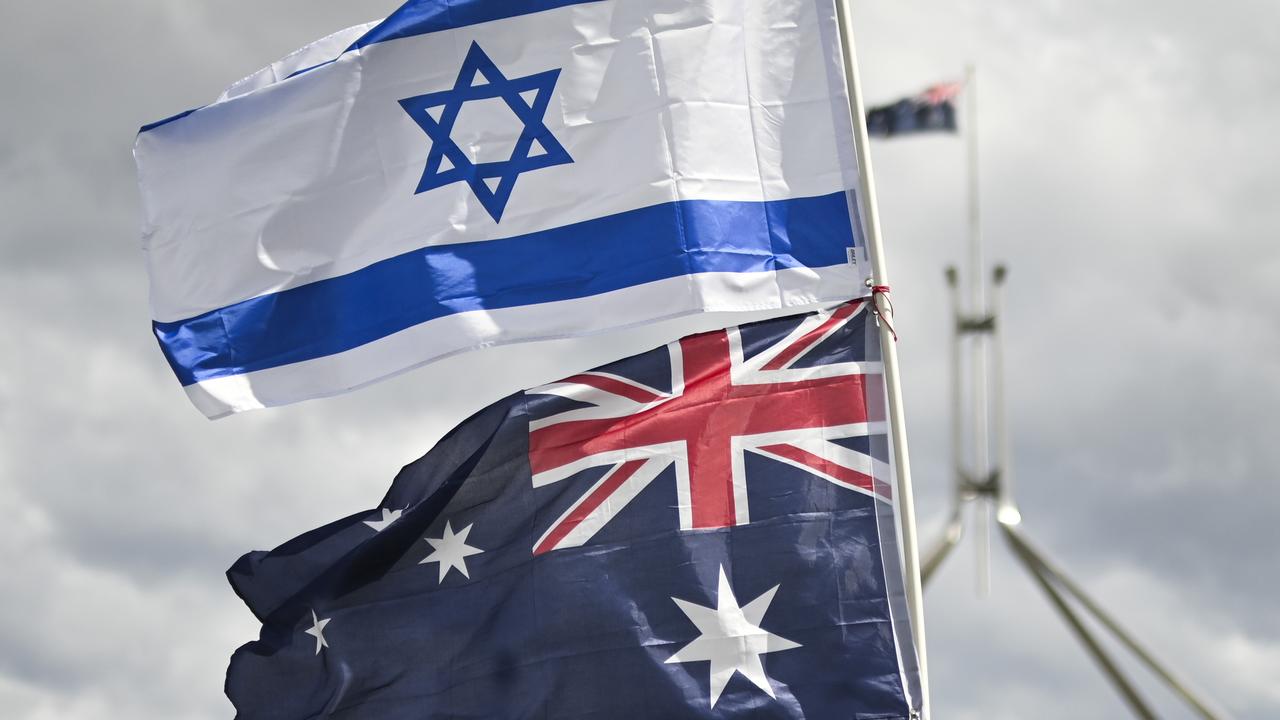Israel-Hamas-Hezbollah conflict live updates: Australians told to leave Israel as PM Benjamin Netanyahu promises ‘merciless’ campaign
With Australian in Israel being told to leave, the country’s Prime Minister has foreshadowed a “merciless” new development in the conflict.
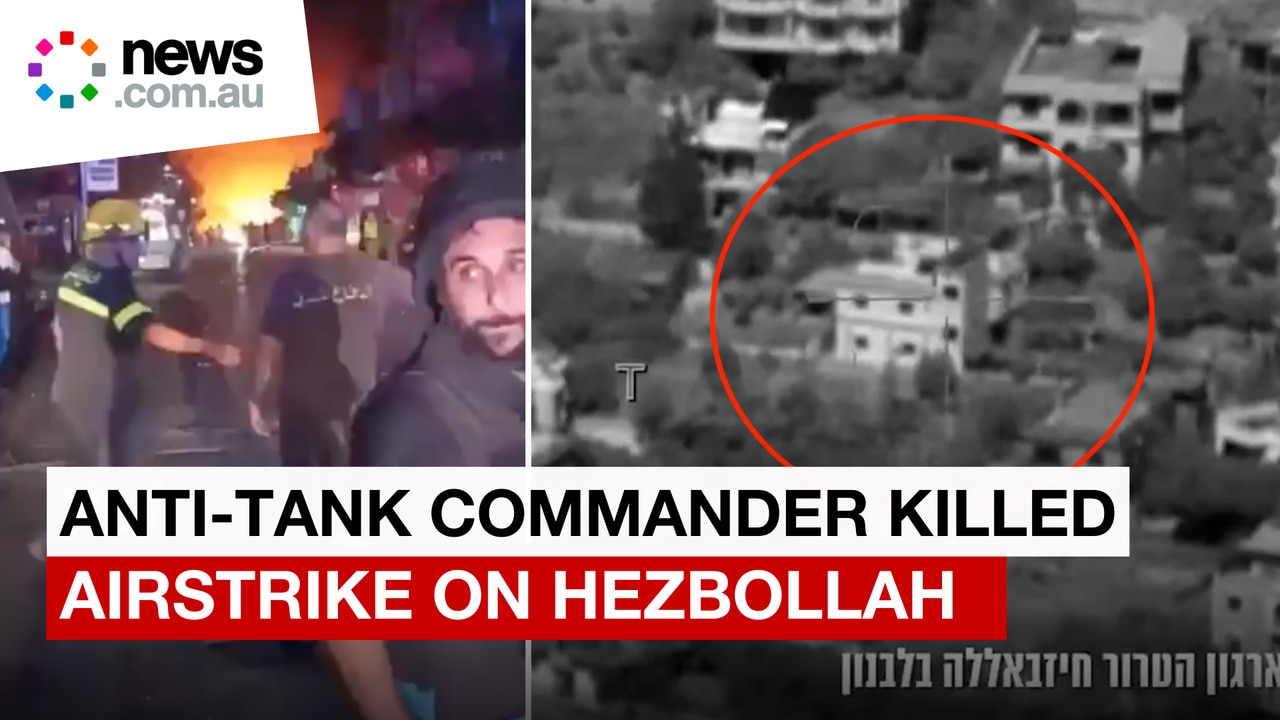
World
Don't miss out on the headlines from World. Followed categories will be added to My News.
A retired top Israeli general has been grilled about his plan to cut off food and water to northern parts of the Gaza Strip, which would force hundreds of thousands of Palestinian civilians to either starve or endure a “walk of death” south.
The plan, from the high profile retired general Giora Eiland, has been proposed against the backdrop of a particularly deadly few days in Gaza, with Israeli strikes on refugee camps, schools and a hospital killing dozens, including children.
More than a year has passed since Hamas launched a surprise attack on southern Israel on October 7, 2023, murdering more than 1200 people, most of them civilians, and kidnapping hundreds.
Israel’s retaliatory bombardment of Gaza has killed more than 42,000.
Hamas still holds about a hundred hostages.
Elsewhere, Israeli Prime Minister Benjamin Netanyahu promised to be “merciless” in his country’s continuing campaign against Hezbollah in Lebanon.
Read on for the latest updates from the conflict in the Middle East.
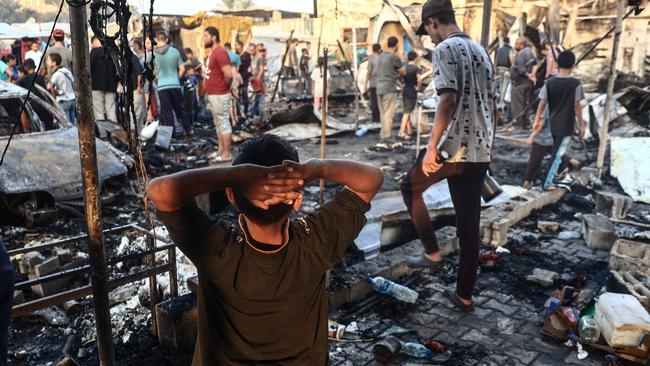
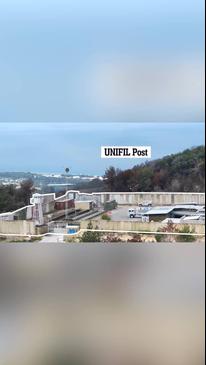
Israeli PM promises ‘no mercy’
Israeli Prime Minister Benjamin Netanyahu has pledged to show no mercy as his country’s military continues its campaign of strikes against Hezbollah in Lebanon.
A year spent exchanging fire across the border escalated into a full-blown war in late September. Hezbollah, which is backed by Iran, and is designated a terrorist group by Australia and other Western nations, is the dominant political force in Lebanon.
On Sunday, local time, a strike it launched against an Israeli base killed four IDF soldiers.
“We will continue to mercilessly strike Hezbollah in all parts of Lebanon, including Beirut,” Mr Netanyahu said today, referring to the Lebanese capital, whose southern suburbs have been repeatedly pounded by Israeli attacks.
The Prime Minister was perhaps alluding to reports, denied by his office, that the United States has been pressuring him to stop striking Beirut.
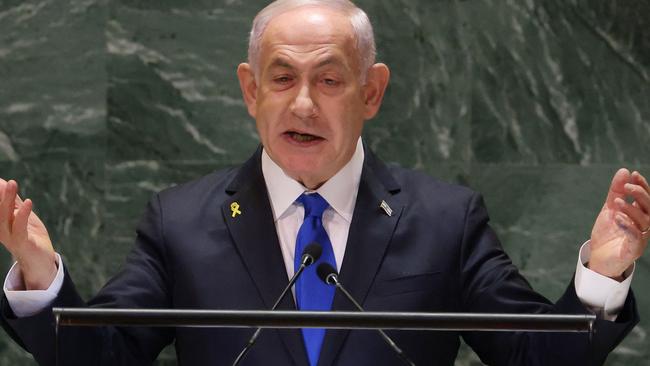
Australians told not to travel to Israel
The Department of Foreign Affairs and Trade has updated its travel advice for Australians, and is now telling us not to travel to Israel.
“We’ve reviewed our advice for Israel and the Occupied Palestinian Territories and have raised the travel advice level,” Smartraveller says.
“We now advise do not travel to Israel and the Occupied Palestinian Territories due to the volatile security situation, armed conflict, civil unrest and terrorism.
“If you’re in Israel, you should leave while commercial flights remain available, border crossings are open and while it’s safe to do so.”
The new advice stresses that there’s “an ongoing threat of missile and rocket attacks in Israel”.
“You should not travel to Israeli border areas with Lebanon,” it adds.
You can read the full advice here, which includes contact numbers for Australians in need of consular assistance.
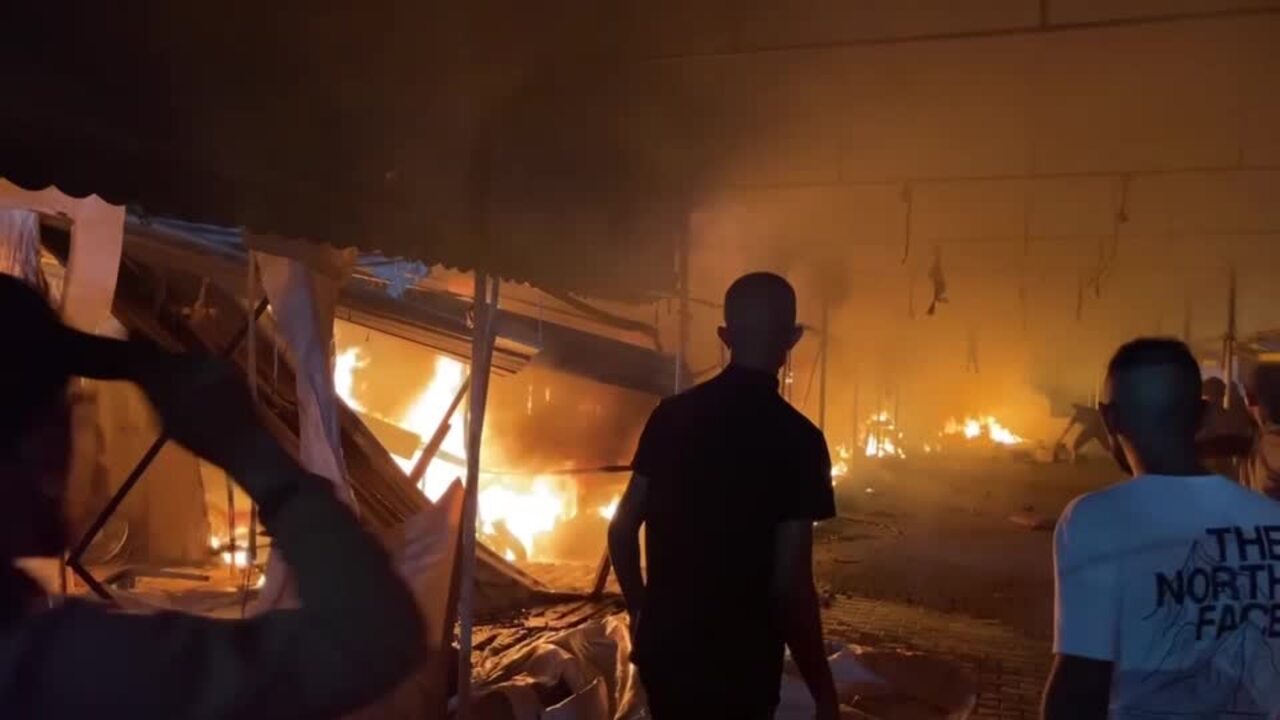
‘15 children’ dead in one Israeli strike
The deadliest Israeli strike in recent days, on Sunday, hit a school in the Nuseirat refugee camp, in central Gaza. According to the Hamas-run civil defence agency, it killed 22 people, including 15 children.
Mahmud Bassal, a spokesman for the agency, said “entire families” had been wiped out and about 50 others had been injured. He described the victims as “martyrs”.
Israel’s military said it was “looking into the reports”.
Hundreds of displaced Palestinians have been sheltering at the al-Mufti school, which was also going to be used as a polio vaccination site on Monday.
The United Nations agency responsible for helping Palestinian refugees, the UNRWA, says Sunday’s strike has now made that impossible.
“Throughout the night, I spoke to a colleague sheltering in the compound who told me, ‘We miraculously survived. The fire caught everywhere; even the tent where we were sleeping burnt. The scene is terrifying,’” said Louise Wateridge, a spokeswoman for the agency.
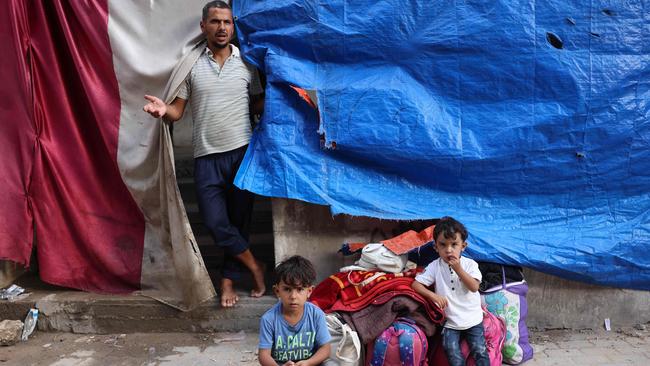
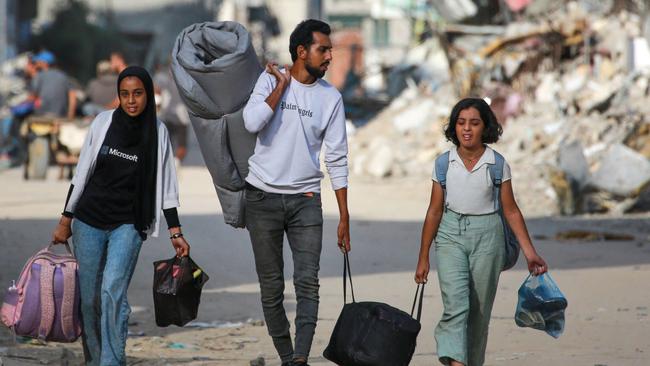
Elsewhere, Palestinian authorities say an Israeli strike on a food distribution centre in the Jabalia refugee camp killed ten people.
Five children playing on the street in the al-Shati refugee camp in Gaza City were killed in a drone attack.
And a strike today on the courtyard of Al-Aqsa hospital, in the city of Deir el-Balah, killed four people, wounding more than 70 others, 25 of whom suffered severe burns.
The hospital was already struggling to treat its patients, having received an influx after the aforementioned strike on the al-Mufti school.
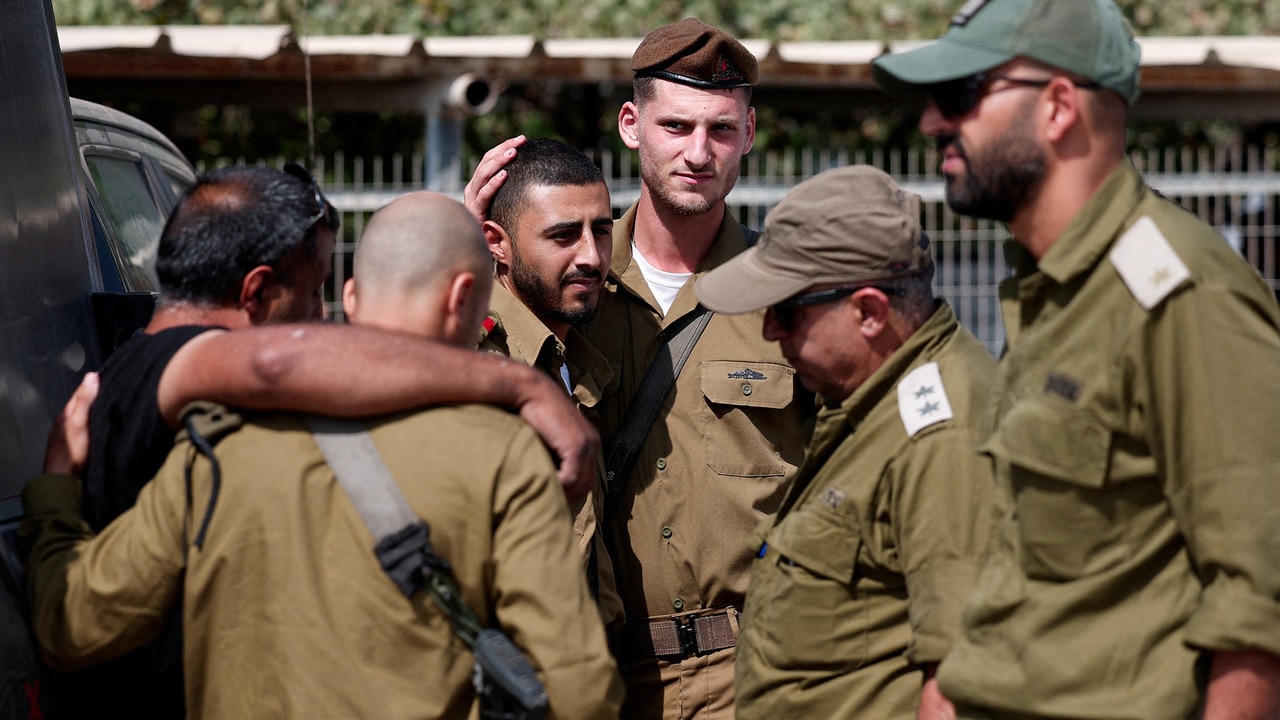
‘Walk of death’: Israeli general grilled
The Israeli military often stresses that Hamas militants hide among the general Palestinian population, using civilians as human shields, to justify its strikes on crowded areas.
In recent days Gen Eiland, a former head of Israel’s national security council, put forward a proposed plan.
It would see the IDF force hundreds of thousands of civilians who remain in northern Gaza south, to the already crowded refugee camps, and then besiege the north, cutting off aid, food and water to the area.
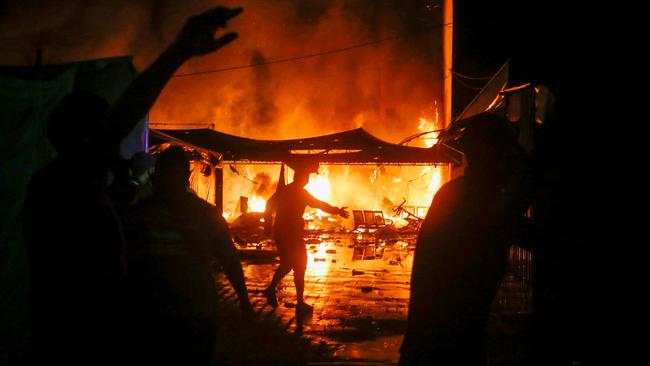
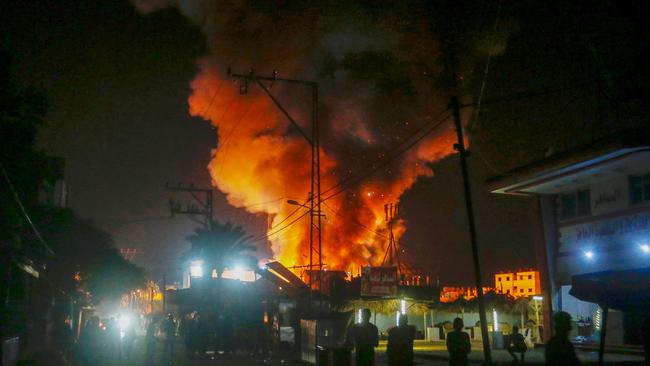
Gen Eiland was interviewed, today, by Sky News UK. Journalist Mark Austin tried to drill down on the intent of his plan.
“You want to tell the 400,000 in northern Gaza to go south to these humanitarian zones, these so-called safe zones, and those who are left will be designated as Hamas fighters, combatants. There’d be no food or water, and the choice would be surrender or starve. Is that, broadly speaking, your plan?” Mr Austin asked.
“Not exactly. And we have to understand why this plan has been presented (before) we begin the discussion about that. We have to understand what is really happening in Gaza first,” Gen Eiland responded.
“From the military point of view, Israel is quite successful in destroying the military capabilities of Hamas. But from the civilian point of view, economic point of view, political point of view, Hamas manages to maintain control of Gaza.”
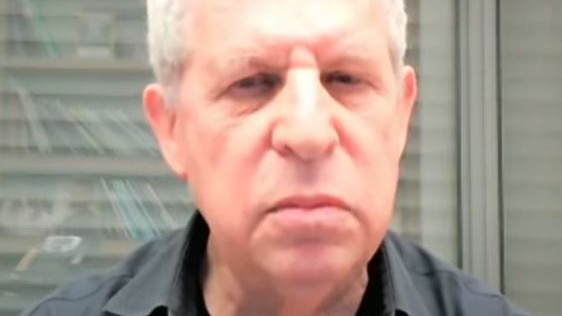
He argued that “all of” the humanitarian aid sent into Gaza was actually “distributed” by Hamas, alleging the terrorist group receives it “for free” and then “sells” it to the civilian populace.
“We have to remember that Hamas is still keeping 101 Israeli hostages,” Gen Eiland added.
“As long as this is the situation in Gaza, Hamas is content.”
“Let me just make a point here,” Mr Austin interjected.
“If civilians either can’t leave or won’t leave, on the grounds that there is nowhere safe, they will starve to death under your plan. And my point is, that is unlawful.”
“I will answer your question,” Gen Eiland said, speaking over the host, though he actually returned to speaking about the hostages.
He argued that Hamas only made an initial deal to release some hostages almost a year ago because Israel had agreed to allow more aid into Gaza, and by reducing that aid again, Israel could “win the war within two months”, saving both Israeli and Palestinian lives.
Mr Austin returned to his point, arguing that Palestinian civilians unable or unwilling to leave northern Gaza would starve to death under the plan Gen Eiland put forward, and that “would be, effectively, going to be a war crime”.
“You can’t forcibly remove civilians. You certainly can’t starve civilians,” he said.
“So are you giving the answer or are you asking the question?” Gen Eiland shot back.
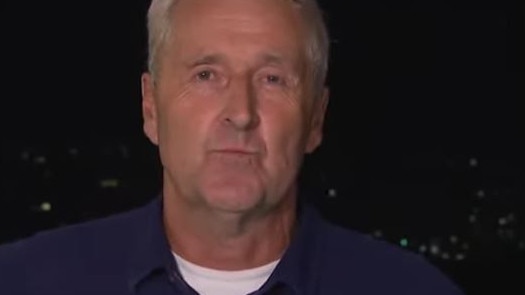
“If the civilians won’t leave voluntarily, what will you do?” asked Mr Austin.
“I understand your question,” Gen Eiland said, adding that Mr Austin had “made some assumptions that are not correct”.
“Let’s agree that a siege is a legitimate, practical measure that can be taken against an enemy. And you can cause your enemy either to surrender, or to die in starvation,” he said.
“Here I’m speaking about combatants. Do you agree with me that this is legal?”
“With combatants! I’m talking about civilians,” Mr Austin said.
“I’m asking you about combatants,” said Gen Eiland.
“Now let’s talk about the civilians. There are about, let’s say, 300,000 people there. Before we begin any real siege, according to our plan, we will (give) all those people about ten days to evacuate and to leave this area with very safe corridors.
“We can ensure that all the civilians who are there, who want to live, even the people who cannot walk, and people who are elderly, and people who are sick and wounded, we can make sure that these people will be evacuated.
“Now, those who decide to stay there, for whatever reason, then this is their choice.
“You mentioned that Hamas will not let them go. Let’s remember that Hamas is the government in Gaza, and what is really happening is that Hamas is shooting at the people who want to leave.”
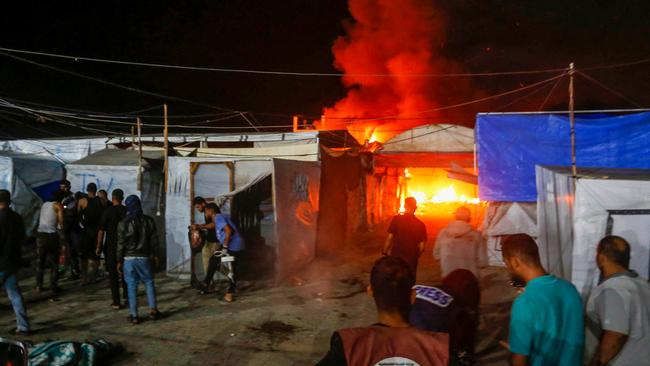
“My final point to you,” Mr Austin interjected.
“My final point to you is that you cannot guarantee the safety of these people, even if they wanted to go, because the safe zones are being bombed and people are dying.
“People are describing the walk south as a ‘walk of death’. You’re not going to persuade people to do that. So the plan is very difficult to implement.”
“OK, what you are saying, it is better to attack this area (with) regular military tactics, and the result will be that thousands of civilians will be killed, because the terrorists and civilians are living together, are operating together. Hamas is using their own civilians as human shields,” Gen Eiland said.
He said Mr Austin was suggesting that, if thousands of civilians were killed in regular military action, it would be “fine”, “legitimate” and “something good”.
“We are trying to create a separation between the combatants and the civilians. And you are telling me no, keep all of them together, fight all of them,” he argued.
“And the result will be thousands of civilians that are killed. This is OK with you.”
“No, I’m not saying that,” Mr Austin replied.
“I’m saying people won’t want to go, and many of them can’t go. That’s all I’m saying. And I’m wondering what the plan was for that.”
The pair went on to have a similarly testy exchange about the situation in Lebanon.
Mr Austin’s next interviewee was Sam Rose, a senior deputy director with the United Nations agency responsible for helping Palestinian refugees.
“Forcible displacement of these people is illegal under international law,” Mr Rose said of the proposal from Gen Eiland.
“As you said, this walk through the ‘valley of death’ if they want to make the move, if they’re allowed out by Hamas, there’s no safe passage for people out of there.”
Mr Rose pointed out that he was speaking to Sky News UK from one of the areas to which Israel would send refugees from the north of Gaza, yet it was still suffering bombings.
“Our life here is a life of bombardment, it’s a life of bombs,” he said, adding that he was just a few kilometres away from the al-Mufti school, where those 15 children were allegedly just killed.
– with AFP
Originally published as Israel-Hamas-Hezbollah conflict live updates: Australians told to leave Israel as PM Benjamin Netanyahu promises ‘merciless’ campaign


